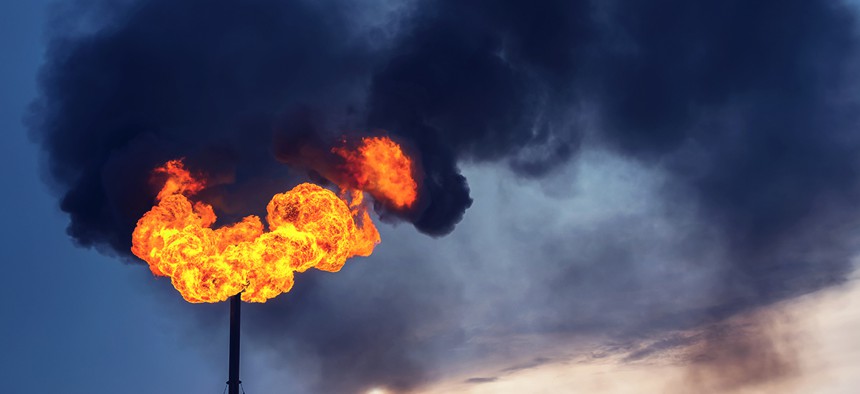
Leonid Ikan/Shutterstock.com
New EPA Rules Would Cut Methane Emissions From Oil and Natural-Gas Industries
The agency wants to reduce emissions by 40 to 45 percent of 2012 levels over the next decade.
The rules would also amend existing regulations and be applicable throughout the oil and natural gas industry, including in production, processing, transmission and storage, the EPA said.
The rules, which would apply only to new and modified gas wells, were first outlined in January by the White House. They follow an announcement earlier this monthof regulations forcing power plants to lower carbon-dioxide emissions by 32 percent from 2005 levels by 2030.
Both gases contribute to global warming, but methane’s global-warming potential (the amount of heat trapped by a specific amount of mass) is more than 25 times greaterthan that of CO2, the EPA says. The oil and gas industry was responsible for about 30 percent of methane emissions in the U.S. in 2012.
“Today, through our cost-effective proposed standards, we are underscoring our commitment to reducing the pollution fueling climate change and protecting public health while supporting responsible energy development, transparency and accountability," EPA Administrator Gina McCarthy said in a statement Tuesday.
The EPA says the proposed rule will reduce between 340,000 and 400,000 short tons of methane in 2025, as well as 170,000 to 180,000 tons of other volatile organic compounds and 1,900 to 2,500 tons of hazardous air pollutants. The announcement comes amid an increase in oil and gas output in the U.S., making the country one of the top energy producers in the world.
The energy industry opposes the regulations.
In a statement, Jack Gerard, the president and CEO of the American Petroleum Institute, called the new rules unnecessary. He said the industry reduced methane emissions by 79 percent since 2005. Carbon-dioxide emissions are at 27-year lows, he said.
“The oil and gas industry is leading the charge in reducing methane,” he said in a statement. “The last thing we need is more duplicative and costly regulation that could increase the cost of energy for Americans.”
Environmental groups welcomed the rules, and called for more action. Kate DeAngelis, who is with the environmental group Friends of the Earth, cheered the changes but added:
We have a serious problem with existing and abandoned wells, and the final rule needs to address them. The real solution to climate change is to leave fossil fuels in the ground and to clean up the abandoned wells that continue to poison our air.
The rules were unveiled a day after the Obama administration gave final approvalto Royal Dutch Shell to drill for oil off the coast of Alaska. Environmental groupscriticized that move.
(Image via Leonid Ikan/Shutterstock.com)






